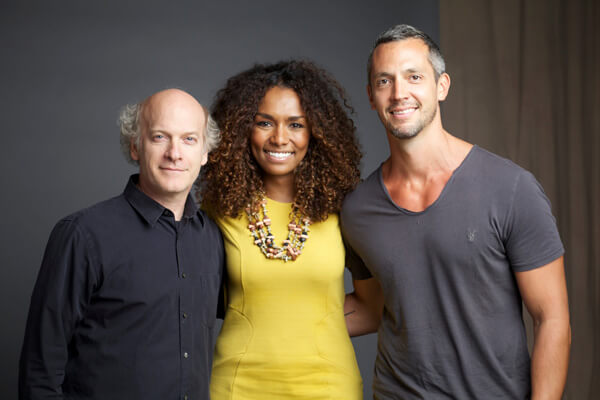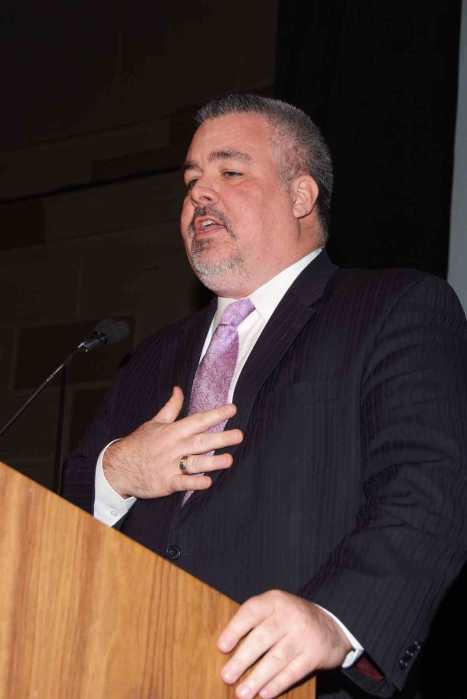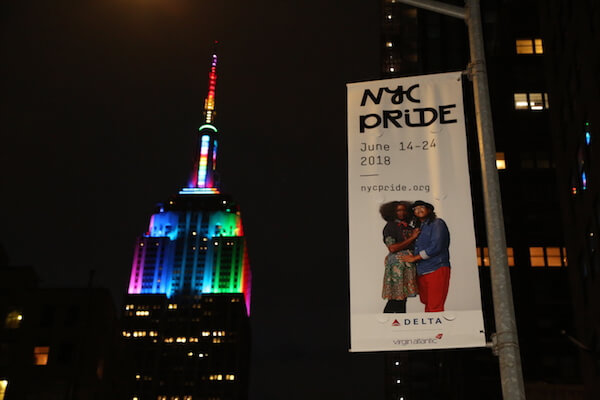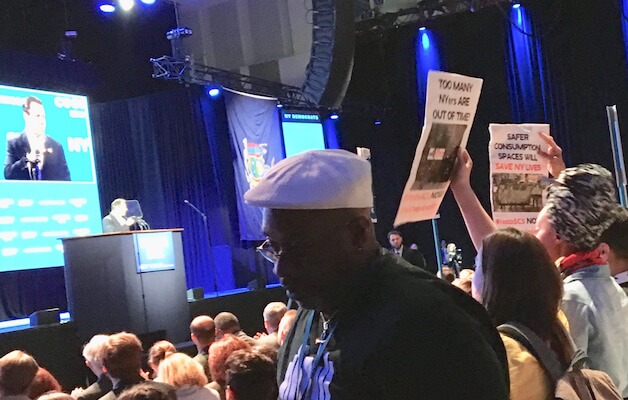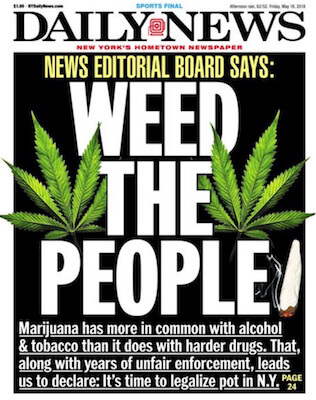Sam McConnell and Cynthia Nixon. | GRAHAM WILLOUGHBY
BY GARY M. KRAMER | Debuting on HBO on June 27 and available on demand the following day, “The Out List” is an hour-long documentary featuring 16 LGBT individuals, each directly addressing the camera for a few minutes to talk about issues important to the queer community. From Lady Bunny’s smart speech about drag queens and self-expression to Larry Kramer’s passionate description of how his anger fueled ACT UP, there is diversity in both topics and talking heads.
It is easy to be inspired by testimony of resilience from folks like Dustin Lance Black and Jake Shears and from the way Ellen DeGeneres, Cynthia Nixon, and Suze Orman discuss the importance of equal marriage rights.
But the best vignettes come from the least well-known subjects, who provide very thoughtful reflections about being queer in America. Latina lesbian Lupe Valdez, a sheriff in Texas, talks about being validated in her conservative community, while Twiggy Pucci Garçon describes the surrogate family he found in the New York ball community.
Gay City News spoke to Sam McConnell, the film’s off-camera interviewer, via Skype from Los Angeles, about creating “The Out List.”
GARY M. KRAMER: How did you get involved in the project?
SAM McCONNELL: I had been involved somewhat in “The Black List.” My [creative] partner Lukas Hauser was the editor of that film, which came out around the time of Obama’s election. And with that election came Proposition 8. There was a march on Washington about LGBT equality, and that was the first time I heard about the wider call for equality in all 50 states. That got me excited. I wanted to see what I could do to be part of this conversation.
I approached Timothy [Greenfield-Sanders, the director] to do a film in the style of “The Black List” to look at LGBT equality. “The Black List” looked back at how people overcame racism and discrimination. Here we have an opportunity to talk with people in a movement while it is unfolding — a civil rights movement of its time.
Sam McConnell, Timothy Greenfield-Sanders bring together 16 whose stories weave part of the tapestry
GMK: What input did you have in forming the criteria for the interview subjects?
SM: We wanted a mix of people who are known and unknown, not just a collection of famous, successful gay people. There are gay people who became successful while being in the closet for most of their lives. We wanted people who were out and not just for their own sake, but that they had a responsibility to a greater community and the betterment of future generations.
GMK: The monologues address coming out, validation, resilience, and marriage equality. How did the topics for discussion arise?
SM: We came up with a long list of topics we felt were important to cover, and then we started coming up with interesting subjects. So we knew we wanted someone to talk about being a parent, so Neil Patrick Harris was great for that. We knew we wanted someone to speak about being in the sports world — one of the places where homophobia is very alive and well — and we found Wade Davis. We knew we wanted someone to speak about the transgender experience, so we found Janet Mock. We wanted the history of the AIDS years and an activist, and we couldn’t imagine the film without Larry Kramer.
GMK: Who or what surprised you in the stories you heard?
SM: Wazina Zondon. Everyone in the film is very brave for speaking their truth, but Wazina in particular shows a real courage for speaking her truth given the attitudes and real ramifications for being out and Muslim.
Timothy Greenfield-Sanders, Janet Mock, and Sam McConnell from “The Out List.” | GRAHAM WILLOUGHBY
GMK: Who did you identify with from “The Out List”?
SM: [Sighs]. I think I identified a little bit with all of them. Maybe Dustin Lance Black, because he had a Mormon upbringing and is a filmmaker and a young gay person. He talked about watching stories — seeing “The 400 Blows” — and what that did to him in opening his eyes to stories about real people and their lives. I remember seeing “My Own Private Idaho,” and that blew my mind and my imagination. It made me want to do something like that as a filmmaker.
Jake Shears and I are friends, and he expressed something about being an outsider — that it does a lot of harm, but it enables the creation of a special family, a connection with others who feel different. As gay culture normalizes and becomes mainstream, there is a little bit of a loss of that specialness. That resonated with me as well.
GMK: I like Jake Shears’ speech very much, but I also felt that what you just said was echoed very eloquently in Twiggy Pucci Garcon’s comments in “The Out List.”
SM: There are so many subcultures within the gay world, but Twiggy does a wonderful job talking about one of them — the ballroom scene. It’s special and has its own dynamics and creates its own family.
GMK: So what would you say if you were being interviewed?
SM: I think for me I would talk about a real defining moment in coming to terms with my identity. I grew up in Salt Lake City, Utah, a place where there was a lot of hatred and misunderstanding about homosexuality. I wasn’t Mormon but it was a very conservative area. A neighboring high school wanted to form a Gay-Straight-Alliance, and the school freaked out and banned all groups.
But I had two out teachers — a French teacher and a history teacher — and because I had them as examples, I got to see what it looked like to be successful and have a career and be in a committed relationship and stand up for yourself. Utah is not a kind place, but they would go to protests and not be ashamed about bringing their partner to events. They gave me hope that I would have a happy and fulfilled life. Because I had those examples in those formative years, I was able to move to New York when I was 18 and accept who I was.

